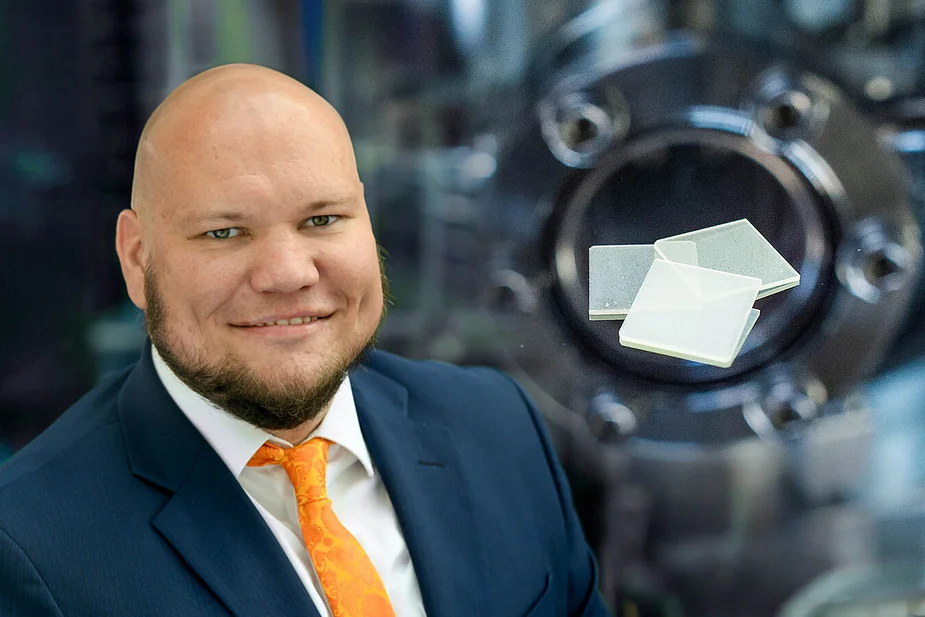BMBF funds IKZ project for efficient power electronics with around 2 million euros
“All-GO-HEMT” project aims to make a significant contribution to sustainable energy generation
Led by Dr. Andreas Fiedler, the “All-GO-HEMT” project aims to develop modulation-doped β-(AlₓGa₁₋ₓ)₂O₃/Ga₂O₃ heterostructures that exhibit high electron mobility. With total project funding of almost 2 million euros, financed by the German Federal Ministry of Education and Research (BMBF), this project is expected to lead to a considerable increase in efficiency in power electronics and thus make a significant contribution to sustainable energy generation.
The “All-GO-HEMT” project utilizes the advantages of gallium oxide (Ga2O3), a material with an ultra-wide band gap that is considered a promising candidate for power electronics. Ga2O3 enables a more compact design, which not only increases the efficiency of the conversion processes, but also improves the reliability of the systems. Compared to established materials such as silicon, gallium nitride and silicon carbide, Ga2O3 offers potential for increasing efficiency that has not yet been fully exploited. “We believe that the development of more efficient materials can make a significant contribution to the energy transition and enable the industry to successfully master the challenges of the future,” explains Dr. Fiedler.
Even though power electronics based on Ga2O3 promise to be more efficient, the material is inferior to established materials in terms of charge carrier mobility. “Gallium oxide behaves to the established materials in the same way as ten meters of dirt road to one kilometer of freeway. Due to the shorter distance, your car consumes less, and despite the lower speed, you reach your destination faster - all thanks to a more compact design,” explains Dr. Fiedler. The central aim of the project is to overcome the material limitation of Ga2O3 in terms of charge carrier mobility with the help of the innovative design of an aluminum-alloyed heterostructure and thus eliminate this disadvantage. Dr. Fiedler emphasizes: “We are convinced that the efficiency of power electronics can be significantly increased through a combination of a more compact design and higher charge carrier mobility in our newly developed materials.”
Another goal of “All-GO-HEMT” is to create a reliable material basis of Ga2O3 and the newly developed alloy with aluminum of the highest crystalline quality for research and industry. This basis is necessary because the development of high-performance devices with compact design and optimized manufacturing processes is currently limited by the insufficient availability of high-quality material. The project partner Ferdinand-Braun Institut (FBH) will use this material basis to develop new prototypes for power electronic devices. These prototypes will then be tested by ZF Friedrichshafen AG, the industrial mentor, for their suitability for industrial application. In addition, the entire value chain, from crystal growth to the finished device, will be analyzed by the industrial mentors AIXTRON SE and Siltronic AG in order to quantify and evaluate the economic and ecological benefits of this technology at an early stage.
The “All-GO-HEMT” project is being funded as part of the prestigious “BMBF NanoMatFutur” competition for young researchers and aims to establish sustainable research structures by supporting excellent young researchers with funding of almost 2 million euros. The NanoMatFutur grant will enable Andreas Fiedler to set up his own independent junior research group at the IKZ over a period of five years. With this grant, he plans to put together a team consisting of a postdoc and two doctoral students to successfully work on this challenging research project and to promote and establish new talent in this promising field of research.
Semiconductor-based power electronics play a central role in the current debate on climate protection and sustainable energy generation. It is a key technology for solving the greatest challenge facing society - sustainable energy production. In addition to the conversion of energy generation to renewable and decentralized sources, the efficient use of energy is the most important lever for achieving sustainability goals in the energy sector. According to a report by AG Energiebilanzen e.V., app. 65% of the energy generated in Germany in 2021, around 2660 petajoules, was lost due to inefficient power conversion processes, as well as flare and line losses. These high losses require urgent solutions. More efficient power electronics not only help to reduce harmful emissions, but also increase the economic efficiency of energy-intensive processes. With “All-GO-HEMT”, an important scientific foundation stone is being laid for technological sovereignty in this central economic sector in Germany.
Contact
Leibniz-Institut für Kristallzüchtung (IKZ)
https://www.ikz-berlin.de
Dr. Andreas Fiedler
+49 30 6392-3125
andreas.fiedler(at)ikz-berlin.de
Stefanie Grüber
Press and Public Relations
+49 30 6392-3263
stefanie.grueber(at)ikz-berlin.de
Press release IKZ, 24 October 2024
